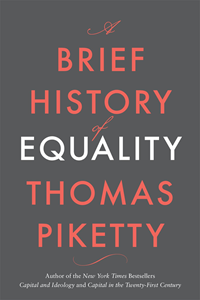Book Review

Thomas Piketty
A Brief History of Equality
Translated by Steven Rendall
Belknap Press, Cambridge, MA, 2022, 274 pp., $27.95
The long march of progress is marked by revolutions, struggles, economic crises, liberations, injustices, and regressions—the “turning points where social conflicts are crystalized and power relationships are redefined,” explains Thomas Piketty in his surprisingly optimistic account of human progress toward equality. Building on his previous works and drawing on the sweeping historical record, Piketty brings his larger argument about the origins of inequality and the political, social, and institutional contexts of its evolution into sharp relief. He shows that human societies have moved toward measurable improvements in the quality of life and fairer distribution of income and assets, but it will take novel solutions to address today’s inequities.
The two world wars and the dislocation of the Great Depression are the backdrop of Piketty’s “great redistribution”—the dramatically reduced income and wealth inequalities across much of the Western world between 1914 and 1980, thanks to the rise of the welfare state and progressive taxation of income and wealth. The welfare state boosted equality of access to education and health care, transportation, old-age pensions, and insurance in the face of economic shocks—expenditures that disproportionately benefited lower- and middle-class people.
This “leap forward” was made possible by unprecedented revenue mobilization: from less than 10 percent of national income in 1910 to between 30 and 40 percent by the century’s middle decades. Progressive taxation lowered the massive concentration of wealth and economic power at the top, leveling both pre- and post-tax inequalities and garnering collective acceptance for the new social and fiscal contract.
Piketty calls this an “anthropological revolution,” occurring as it did during the gradual erosion of exclusive control by the dominant political classes. Universal suffrage and electoral competition, spurred by an independent press and the labor union movement, he notes, was instrumental in ensuring majoritarian prosperity. In addition, the liquidation of colonial assets and cancellation of public debts accumulated during the interwar periods freed up resources for reconstruction and redistribution.
The sharply rising concentration of incomes and wealth since the 1980s and persistence of inequity in all its forms speak to the urgency of the need for transformation. Piketty questions the centrality of growth to economic prosperity, arguing that financial liberalization, deregulation, and loopholes in the international tax system have favored the largest fortunes to the detriment of others, including in the global South. The result is a system where political power and economic resources have increasingly coalesced.
His proposed solutions include a return to greater fiscal progressivity: significantly steeper income tax rates on high earners, a global wealth tax on the well-off, basic income programs, and cancellation of debts. Progress would be marked by publicly financed elections, worker involvement in the management of large enterprises, a welfare state that extends beyond national borders, and revision of global treaties to address climate change and the unequal distribution of wealth. Past experience, Piketty notes, offers hope that such “a profound transformation of the world economic system” is possible.
Opinions expressed in articles and other materials are those of the authors; they do not necessarily reflect IMF policy.









